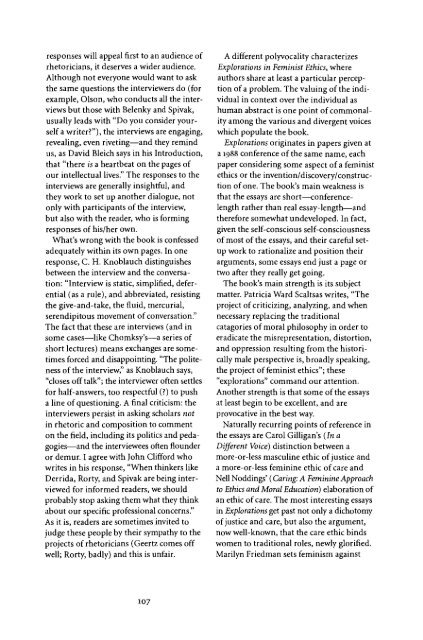To All Appearances A Lady - University of British Columbia
To All Appearances A Lady - University of British Columbia
To All Appearances A Lady - University of British Columbia
You also want an ePaper? Increase the reach of your titles
YUMPU automatically turns print PDFs into web optimized ePapers that Google loves.
esponses will appeal first to an audience <strong>of</strong><br />
rhetoricians, it deserves a wider audience.<br />
Although not everyone would want to ask<br />
the same questions the interviewers do (for<br />
example, Olson, who conducts all the interviews<br />
but those with Belenky and Spivak,<br />
usually leads with "Do you consider yourself<br />
a writer?"), the interviews are engaging,<br />
revealing, even riveting—and they remind<br />
us, as David Bleich says in his Introduction,<br />
that "there is a heartbeat on the pages <strong>of</strong><br />
our intellectual lives." The responses to the<br />
interviews are generally insightful, and<br />
they work to set up another dialogue, not<br />
only with participants <strong>of</strong> the interview,<br />
but also with the reader, who is forming<br />
responses <strong>of</strong> his/her own.<br />
What's wrong with the book is confessed<br />
adequately within its own pages. In one<br />
response, C. H. Knoblauch distinguishes<br />
between the interview and the conversation:<br />
"Interview is static, simplified, deferential<br />
(as a rule), and abbreviated, resisting<br />
the give-and-take, the fluid, mercurial,<br />
serendipitous movement <strong>of</strong> conversation."<br />
The fact that these are interviews (and in<br />
some cases—like Chomksy's—a series <strong>of</strong><br />
short lectures) means exchanges are sometimes<br />
forced and disappointing. "The politeness<br />
<strong>of</strong> the interview," as Knoblauch says,<br />
"closes <strong>of</strong>f talk"; the interviewer <strong>of</strong>ten settles<br />
for half-answers, too respectful (?) to push<br />
a line <strong>of</strong> questioning. A final criticism: the<br />
interviewers persist in asking scholars not<br />
in rhetoric and composition to comment<br />
on the field, including its politics and pedagogies—and<br />
the interviewees <strong>of</strong>ten flounder<br />
or demur. I agree with John Clifford who<br />
writes in his response, "When thinkers like<br />
Derrida, Rorty, and Spivak are being interviewed<br />
for informed readers, we should<br />
probably stop asking them what they think<br />
about our specific pr<strong>of</strong>essional concerns."<br />
As it is, readers are sometimes invited to<br />
judge these people by their sympathy to the<br />
projects <strong>of</strong> rhetoricians (Geertz comes <strong>of</strong>f<br />
well; Rorty, badly) and this is unfair.<br />
A different polyvocality characterizes<br />
Explorations in Feminist Ethics, where<br />
authors share at least a particular perception<br />
<strong>of</strong> a problem. The valuing <strong>of</strong> the individual<br />
in context over the individual as<br />
human abstract is one point <strong>of</strong> commonality<br />
among the various and divergent voices<br />
which populate the book.<br />
Explorations originates in papers given at<br />
a 1988 conference <strong>of</strong> the same name, each<br />
paper considering some aspect <strong>of</strong> a feminist<br />
ethics or the invention/discovery/construction<br />
<strong>of</strong> one. The book's main weakness is<br />
that the essays are short—conferencelength<br />
rather than real essay-length—and<br />
therefore somewhat undeveloped. In fact,<br />
given the self-conscious self-consciousness<br />
<strong>of</strong> most <strong>of</strong> the essays, and their careful setup<br />
work to rationalize and position their<br />
arguments, some essays end just a page or<br />
two after they really get going.<br />
The book's main strength is its subject<br />
matter. Patricia Ward Scaltsas writes, "The<br />
project <strong>of</strong> criticizing, analyzing, and when<br />
necessary replacing the traditional<br />
catagories <strong>of</strong> moral philosophy in order to<br />
eradicate the misrepresentation, distortion,<br />
and oppression resulting from the historically<br />
male perspective is, broadly speaking,<br />
the project <strong>of</strong> feminist ethics"; these<br />
"explorations" command our attention.<br />
Another strength is that some <strong>of</strong> the essays<br />
at least begin to be excellent, and are<br />
provocative in the best way.<br />
Naturally recurring points <strong>of</strong> reference in<br />
the essays are Carol Gilligan's {In a<br />
Different Voice) distinction between a<br />
more-or-less masculine ethic <strong>of</strong> justice and<br />
a more-or-less feminine ethic <strong>of</strong> care and<br />
Nell Noddings' (Caring: A Feminine Approach<br />
to Ethics and Moral Education) elaboration <strong>of</strong><br />
an ethic <strong>of</strong> care. The most interesting essays<br />
in Explorations get past not only a dichotomy<br />
<strong>of</strong> justice and care, but also the argument,<br />
now well-known, that the care ethic binds<br />
women to traditional roles, newly glorified.<br />
Marilyn Friedman sets feminism against<br />
107

















